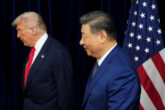October 27, 2022
Xi Jinping: An Echo of Saddam?
Xi Jinping’s consolidation of power at the recent Communist Party congress in Beijing was accomplished with a Shakespearean twist. Xi’s predecessor as president, Hu Jintao, seated next to Xi, appeared to be forcibly removed from the closing session of the congress by two attendants before the television cameras. Hu had presided over a comparatively open and prosperous political and economic system, when U.S.-China relations seemed stable and improvable. While there may be a mundane explanation for Hu’s removal from the congress, such as a health scare, given the perfectionist choreography of these events, chances are that Xi himself had ordered Hu’s public humiliation.
For both men, absolute power was not enough. Someone had to be publicly humiliated in a dramatic fashion in order to drive the point home.
It recalled to my mind another such humiliation, albeit far more brutal. On July 22, 1979, six days after officially replacing Ahmed Hassan al-Bakr as president of Iraq, Saddam Hussein convened a meeting of Baath Socialist party leaders which he ordered videotaped and which is available on YouTube. Seated on stage, Saddam announced that sixty-six party leaders had been uncovered as traitors and comprised a fifth column. As each name was read out, guards grabbed a baffled man from his seat in the audience and forced him out of the auditorium. At the end of this process, those still seated, white with both fear and relief, spontaneously leaped to their feet shouting undying loyalty to Saddam. Of the sixty-six named, twenty-two were quickly ordered executed by firing squads. Wider purges followed that autumn. The country now was literally Saddam’s. He had achieved total fear.
Read the full article from National Interest.
More from CNAS
-
Chinese Maker of Bitcoin-Mining Machines Is a Security Threat, Says Expert
Bloomberg News reports that a Chinese manufacturer, Bitmain Technologies Ltd, that sells most of the world’s Bitcoin-mining machines — including 16,000 of them to a venture ba...
By David Feith
-
Indo-Pacific Security / Energy, Economics & Security
North Korea’s Provocations, Power Plays, and Shifting AlliancesTensions on the Korean Peninsula have reached a new and dangerous threshold. President Lee Jae Myung is warning of a real risk of accidental military clashes, as the situation...
By Dr. Go Myong-Hyun
-
Indo-Pacific Security / Energy, Economics & Security
How to Win the Economic War with ChinaTrump's approach to China has run aground, giving Beijing unprecedented advantage in the economic conflict....
By Edward Fishman & Julian Gewirtz
-
Indo-Pacific Security / Technology & National Security
Sharper: Tech + ChinaRecent talks between President Donald Trump and Chinese Communist Party General Secretary Xi Jinping placed a spotlight on emerging technologies, from high-end chips to minera...
By Charles Horn & Sevi Silvia




